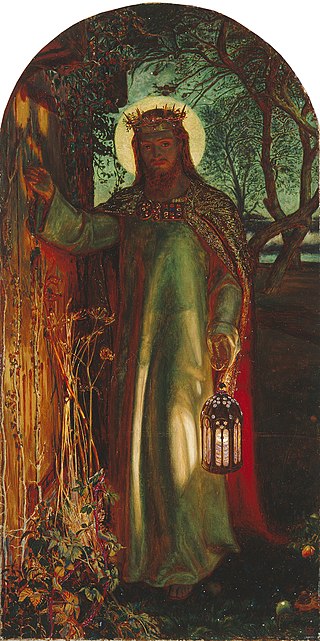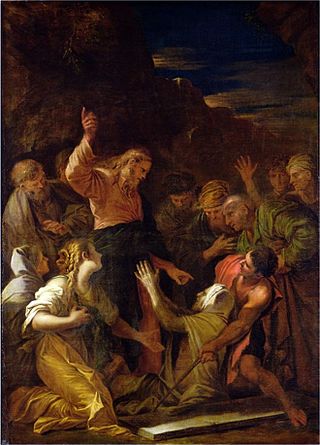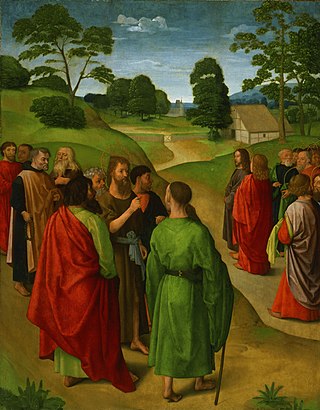Origen: "After this testimony, Jesus is seen coming to John, not only persevering in his confession, but also advanced in goodness: as is intimated by the second day. Wherefore it is said, The next day John seeth Jesus coming to him. Long before this, the Mother of Jesus, as soon as she had conceived Him, went to see the mother of John then pregnant; and as soon as the sound of Mary’s salutation reached the ears of Elisabeth, John leaped in the womb: but now the Baptist himself after his testimony seeth Jesus coming. Men are first prepared by hearing from others, and then see with their own eyes. The example of Mary going to see Elisabeth her inferior, and the Son of God going to see the Baptist, should teach us modesty and fervent charity to our inferiors. What place the Saviour came from when He came to the Baptist we are not told here; but we find it in Matthew, Then cometh Jesus from Galilee to Jordan unto John to be baptized of him. (Matt. 3:13)"
Chrysostom: "Or; Matthew relates directly Christ’s coming to His baptism, John His coming a second time subsequent to His baptism, as appears from what follows: I saw the Spirit descending, &c. The Evangelists have divided the periods of the history between them; Matthew passing over the part before John’s imprisonment, and hastening to that event; John chiefly dwelling on what took place before the imprisonment. Thus he says, The next day John seeth Jesus coming to him. But why did He come to him the next day after His baptism? Having been baptized with the multitude, He wished to prevent any from thinking that He came to John for the same reason that others did, viz. to confess His sins, and be washed in the river unto repentance. He comes therefore to give John an opportunity of correcting this mistake; which John accordingly did correct; viz. by those words, Behold the Lamb of God, which taketh away the sin of the world. For He Who was so pure, as to be able to absolve other men’s sins, evidently could not have come thither for the sake of confessing His own; but only to give John an opportunity of speaking of Him. He came too the next day, that those who had heard the former testimonies of John, might hear them again more plainly; and other besides. For he saith, Behold the Lamb of God, signifying that He was the one of old sought after, and reminding them of the prophecy of Isaiah, and of the shadows of the Mosaic law, in order that through the figure he might the easier lead them to the substance."
Augustine: "If the Lamb of God is innocent, and John is the lamb, must he not be innocent? But all men come of that stock of which David sings sorrowing, Behold, I was conceived in wickedness. (Ps. 51:5) He then alone was the Lamb, who was not thus conceived; for He was not conceived in wickedness, nor in sin did His mother bear Him in her womb, Whom a virgin conceived, a virgin brought forth, because that in faith she conceived, and in faith received."
Theophylact of Ohrid: "He is called the Lamb of God, because God the Father accepted His death for our salvation, or, in other words, because He delivered Him up to death for our sakes. For just as we say, This is the offering of such a man, meaning the offering made by him; in the same sense Christ is called the Lamb of God Who gave His Son to die for our salvation. And whereas that typical lamb did not take away any man’s sin, this one hath taken away the sin of the whole world, rescuing it from the danger it was in from the wrath of God. Behold Him1 Who taketh away the sin of the world: he saith not, who will take, but, Who taketh away the sin of the world; as if He were always doing this. For He did not then only take it away when He suffered, but from that time to the present, He taketh it away; not by being always crucified, for He made one sacrifice for sins, but by ever washing it by means of that sacrifice."
Gregory the Great: "But then only will sin be entirely taken away from the human race, when our corruption has been turned to a glorious incorruption. We cannot be free from sin, so long as we are held in the death of the body."
Theophylact of Ohrid: "Why does he say the sin of the world, not sins? Because he wished to express sin universally: just as we say commonly, that man was cast out of paradise; meaning the whole human race."
Glossa Ordinaria: "Or by the sin of the world is meant original sin, which is common to the whole world: which original sin, as well as the sins of everyone individually, Christ by His grace remits."
Augustine: "For He Who took not sin from our nature, He it is Who taketh away our sin. Some say, We take away the sins of men, because we are holy; for if he, who baptizes, is not holy, how can he take away the other’s sin, seeing he himself is full of sin? Against these reasoners let us point to the text; Behold Him Who taketh away the sin of the world; in order to do away with such presumption in man towards man."
Origen: "As there was a connexion between the other sacrifices of the law, and the daily sacrifice of the lamb, in the same way the sacrifice of this Lamb has its reflection in the pouring out of the blood of the Martyrs, by whose patience, confession, and zeal for goodness, the machinations of the ungodly are frustrated."

















